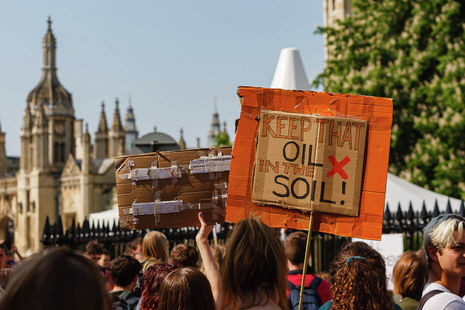Greenwashing isn’t a problem
The university’s moratorium on fossil fuel funding will bring no practical benefit, and instead spur backlash, argues Hugh Jones

Environmental activists might be best known for their gloomy predictions of eco-apocalypse, but those in Cambridge finally have a reason to celebrate, or at least put down the orange spray paint for a bit. Last month, the University finally bowed to their persuasive combination of megaphones and property damage and, with a couple of exceptions, placed “a temporary moratorium on new funded collaborations with fossil fuel companies”.
The move is meant to tackle ‘greenwashing’: polluting companies striking deals with prestigious institutions, in the hope that some of their lovely prestige will rub off and make people forget about all the oil spills and dead dolphins. It comes after a report last year told Cambridge that taking oil money is reputationally risky. Academics prodded them to act on that report, and the University Council has finally acquiesced.
The catch is that there are already guidelines which stop Cambridge from taking money “where to do so would be incompatible with the best interests of the University”. What’s more, because the University Council has pledged to tackle climate change, that ‘best interests’ test already rules out taking money which would jeopardise Cambridge’s quest for net zero. In other words, the greenwashing ban Cambridge replaces the current, nuanced system with a blanket ban which stops the University from taking oil money even if there are absolutely no downsides.
That, you might say, is for the best. Climate change is a problem, and fossil fuel companies sell a product which makes it worse. To which I would say: “So what?”
“BP and its ilk are not so evil that it is never acceptable to take their money”
The problem with the arguments about greenwashing are that they exaggerate how evil fossil fuel companies actually are. We should all want fossil fuels to be extracted and burned as cleanly, cheaply, and efficiently as possible, while we transition to green energy as quickly as possible. Yes, fossil fuels cause global warming, but they also keep lights on and homes warm. The former is bad, but we can’t go without the latter, so compromises have to be made.
Once you accept this premise – which is the basis for all realistic discussion about climate policy – it’s clear that BP and its ilk are not so evil that it is never acceptable to take their money. The situation is complicated, because they sell something which we still need. It is possible to imagine research their funds could support – into better drilling methods, say – which would benefit oil companies, consumers, and the planet. Not doing that research because a big scary oil company wants to pay for it is not only silly, but counterproductive.
Equally, oil companies might do bad things, and profit from a regrettable trade, but this doesn’t automatically mean they should not be allowed to boost their reputations by funding good projects. One has to weigh the pros and cons – as Cambridge was doing before the ban. It is hypocritical to treat fossil fuel companies as pariahs while buying their oil and gas. Despite what the environmentalists might want, we cannot escape that hypocrisy by ‘just stopping oil’, because doing so would inflict vast and democratically unsustainable economic hardship on millions of people. Instead we will have to ‘just phase out oil, hopefully as quickly as possible’ – and, in the meantime, we might as well keep taking the donations.
“Environmentalists…need to persuade rather than protest”
Ultimately, climate activists’ biggest challenge is persuading voters to make sacrifices in the name of net zero. If you are paralysed with fear about climate change, you should be trying to work out the most efficient set of compromises you can ask people to make, in order to reduce our national carbon emissions without causing a backlash. Instead, the most vocal and visible campaigners seem driven by an alienating puritanism. People at the University will suffer as a result of this fossil fuel funding ban, despite it bringing almost no practical benefit. Researchers will miss opportunities, students will lose out on PhD funding, and Cambridge will do a little bit less of its world-improving work.
I don’t want to catastrophize. Cambridge doesn’t get that much money from fossil fuel companies, the ban is only partial – a temporary moratorium on new donations – and hopefully cash from elsewhere will replace that which is being foregone. The real danger this move presents lies in what it says about the environmental movement. It is almost obscene for Cambridge to turn down good money while the rest of the British university sector (with one exception) suffers acutely as tuition fees continue to fall in real terms. As an infamously and literally cloistered institution, Cambridge can afford to be idiosyncratic. Environmentalists, however, still haven’t realised that if they are to succeed, they need to persuade rather than protest. What they should fear most is not moving too slowly, but igniting opposition which reverses their gains. Just ask yourself which is more likely to hurt the environmental movement: a few BP-branded lab coats, or voters believing that net-zero is not about saving the planet, but rather a radical, elitist fad – and one which they are being asked to pay for.
 News / Cambridge study finds students learn better with notes than AI13 December 2025
News / Cambridge study finds students learn better with notes than AI13 December 2025 Features / Should I stay or should I go? Cambridge students and alumni reflect on how their memories stay with them15 December 2025
Features / Should I stay or should I go? Cambridge students and alumni reflect on how their memories stay with them15 December 2025 News / Uni Scout and Guide Club affirms trans inclusion 12 December 2025
News / Uni Scout and Guide Club affirms trans inclusion 12 December 2025 Comment / The magic of an eight-week term15 December 2025
Comment / The magic of an eight-week term15 December 2025 News / Cambridge Vet School gets lifeline year to stay accredited28 November 2025
News / Cambridge Vet School gets lifeline year to stay accredited28 November 2025









